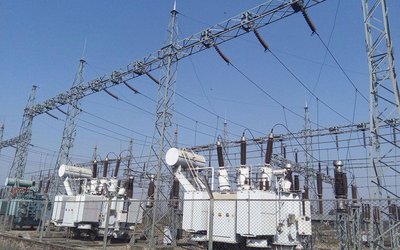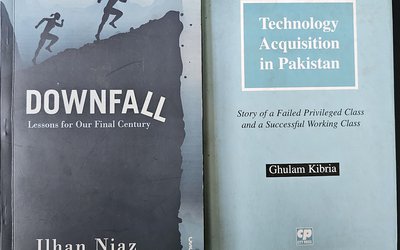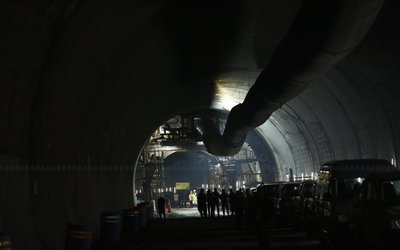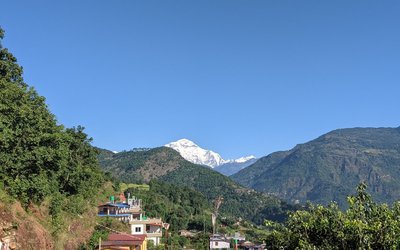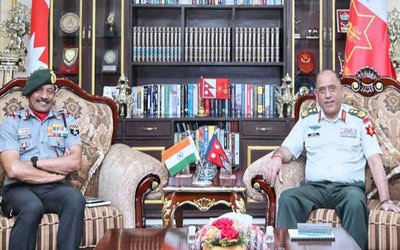
As the acting chairperson of AIN, how do you see the role of INGOs in the post earthquake works?
We did a huge amount of work immediately in the aftermath of the great earthquakes and we tried to do as much we could in post relief to counter the effects of monsoon and winter. Now, we have another mode of operation and our contribution is based on the population that we know and we supported since the earthquake. We are very familiar with the environment and we have relations with the CDOs, LDOs and VDC secretaries. These allow us to better design interventions.
How do you see the role of INGOs?
As INGOs have a whole range of skills, they support everything from WASH to livelihood to shelter and housing to disaster risk reduction, disability, management, health and education. INGOs can provide support in all development sectors with the line ministries. The government knows it well and we have been working with it for so many years. We support the government by working hand and hand with its strategy. As Ministry of Health and Population and Education provided a recovery plan, INGOs and NGOs supported them. We are all working on the recovery plan. With the Ministry of Education, we have been providing support in school design and construction with other donor partners. As so many school buildings and health facilities are destroyed, they cannot be built overnight. We were able to put temporary structures in place in health and education. Because of the efforts of all the stakeholders, a majority of the students are able to study in good conditions. Most of health services have been restored. That is where we focused upon with our ability to provide service. On WASH, there is a huge amount of work to do in vast territory.
How do you see your role in relation to NRA?
We rely on the districts and the National Reconstruction Authority (NRA) to support the choice of location so that we can decide where the need is to work first. The big question is individual housing. INGOs have been contributing to designs with the expertise in disaster preparedness and training of masons. We had a little bit of setback as NRA tried to manage the things. What I can say is that a huge amount of training has already taken place. Now, we are waiting for approval from NRA to do our work. We don’t do house building on ourselves. We help to facilitate to identify the vulnerable people. All these different steps need to be taken and it will take a certain time.
How do you see the situation in the earthquake devastated districts following the constitution of National Reconstruction Authority?
NRA has been extremely open to dialogue with AIN. We are extremely grateful to NRA and it is also a great example for other branches of government to be so open and decide issues on the basis of trust. It took a little bit of time. Pre-discussion also takes time. Within NRA, there are different levels of decision making and they have to agree with our deliberations. NRA has been facing constraints as any new agency set up in the government. They have a lot of support, we have concluded institutional arrangements for the INGOs. A few projects have already been approved. We are confident that by the end of May those who have submitted projects will start operating.
As there is criticism in the media about the role of NGOs and INGOs as being involved only in software side, don’t you think INGOs too need to come out with help for hardware infrastructure?
There is a perception that the INGOs have money and this money has to be automatically converted into hardware and delivered to the people. We have been doing what the government does. A lot of government expenditure is on service sectors and they are not hardware. For example, consultation is not hardware. In the particular case of recovery, NRA has made explicit requests for more capacity building and more software. NRA told us that they do not want us to do construction. However, NRA wants us to train masons with the coordination with districts. We are asked to provide the software. What we have been doing is in accordance with the coordination with the government.
Do you have hardware component as well?
Yes, we do also provide hardware. There are a lot of cash transfers done and some specific medicines were provided and a lot of hardware was also present including construction of schools, health posts and other. I think, however, it is very difficult to see them in terms of percentage of budget. We are asked to provide fifty percent of our budget in hardware.
How do you see software and hardware debate?
There is the need to do a bit more analysis of reporting on this hardware and software issue. We can convince everybody on what we have been doing and of course, we have been working with government line agencies. We have made the right choices to use our budgets. Software part is also very costly. If you want to reach to most remote parts of the country to meet need of the obvious people, it will cost higher for transportation. That is the only way to deliver the hardware.
There are also complaints that INGOs have been spending a lot of their budget in advocacy. How do you look at this?
The problem, I think, is with the definition of advocacy. Many of us try to help in making policy choices and it often requires a lot of technical expertise. INGOs bring this expertise and INGOs may call it advocacy. What we are doing is helping in framing policy. Our ability is to go and serve in the most remote areas. We have also the experiences of other countries that have fewer resources. We help the people to make choices. However, it is up to the government to implement them. There are ministries that have been keen for this dialogue like Ministries of Education and Health. The collaboration with these ministries is very productive. We know from the earthquake response what results that brings. There are other issues of advocacy that is more around the rights of marginalized communities and access to services. I worked in countries where civil society, like in Nepal, is a lot more vocal. Here we understand the sensibilities of the issues on hardware. I hope the change will come.
What do you want to say to such critics?
We really want to encourage journalists and government officials to come with us to the field and see what we have been doing and talk about the our quality of works. As all our projects are evaluated by the Social Welfare Council and we launch the program only after the approval of the government, they all know what INGOs have been doing. I encourage them to speak and defend our quality work. Our beneficiaries are satisfied with our quality work.
The recent earthquake has shown that the major victims of earthquake are the persons with disabilities. As an organization supporting such people, how do you see the state of people with disabilities?
The situation is both positive and, at the same time, there are still many challenges. It is positive because of all the preparedness work we are able to do with the Ministry of Health and because services exist on physical rehabilitation. There are a very few long-term sustained injuries. There are still many people suffering from injuries after earthquake. However, they will be able to regain their ability to move or overcome their trauma in a few months. We have a record of less than fifty amputations which is extremely low considering the number almost 9000 deaths. This is because the quality of health intervention as the surgeons in Nepalese hospitals followed the protocols and physiotherapists were able to help the patients so that the communities were able to take care of the wounds in proper way.
What do you see is the issue with the persons with disabilities?
The issue now is the people with disabilities who had disabilities before earthquake and after earthquake. The social protection mechanism in Nepal, especially in the earthquake affected remote districts, is still minimum.
What interventions are required there?
Specific interventions are required. Interventions are often one to one with the families because it is very important to understand what are their specific situations. You cannot generalize. Every family has its own unique experiences related to disabilities. Some may be already extremely wealthy and some may be extremely poor. There are many poor people who do not know about the services available. Social protection really provides information and resources to be able to address this package of issues and needs. Handicap International has been working through the regional hospitals and we are doing a fantastic work with the existing hospital structures for earthquake victims and for all the other people with disabilities who did not have the services before. The earthquake provided the opportunities to use the new service such as physiotherapy. We are also working with the disabled people's organizations so that they can be a channel to express the issue of people with disabilities faced and then we tried to connect with other service providers like Women and Children's Office so that those needs are answered.
Has Handicap International supported to build temporary shelters for the people with disabilities?
Yes. We are working on two issues. We supported people with disabilities to build temporary shelters after the earthquake. Now we are training people who will be working on shelters to target the very vulnerable people with disabilities and make sure that the houses designed have adequate facilities, considering the persons with disabilities. One of the biggest problems for the persons with disabilities is of mobility in toilets and it is very easy to build the toilets that are accessible to a person who is on wheelchair. Actually, it does not cost any additional money and it is just a question for design and that only a few people have this knowledge. HI will provide this expertise and this is very specific expertise or occupational therapy (OT).There are just six OT on the whole Nepal. This is in the spirit of building back better.
As Nepal is one of the vulnerable countries in terms of natural disaster, how important is it to link the persons with disabilities in our national disaster risk reduction strategy?
This is something we have been working on for some time. I was very pleased to see PDRF document which NRA has in its strategy for recovery. There are so many mentions of people with disabilities. For me it is a sign that in Nepal, the issue of disabilities is gradually gaining focus in policy. In disaster preparedness, HI worked a lot in far west and mid-west regions in the issues related to disasters. All the training and protocols delivered by the government or NGOs includes specific items on disabilities. It can be very simple things like developing warning systems that are disability proof. If you are deaf or blind, you still don’t know when the flood is coming. There is the need to make things visible for people with disabilities.
What is your experience working with NRA?
We have a very positive experience of working with NRA. AIN members have a long standing experience of working with the sectoral ministries. Of course, paper works take time but all the cross-cutting ministries have been working with us. We really want to continue this trust. For this, people understand our work and not jump to any conclusion without seeing the work in the ground.

Keshab Poudel
Poudel is the editor of New Spotlight Magazine.
- ECONOMY: Growth At 3.3
- Apr 16, 2024
- DPM’s SHRESTHA’S CHINA VISIT High Profile, Low Key
- Apr 14, 2024
- Maha Kumbha In Barahkshetra: A Sacred Festival In Sacred Koshi (Kaushiki) River
- Apr 09, 2024
- LOSS AND DAMAGE: Upper Tamakoshi A Case
- Apr 02, 2024
- Helvetas-Nepal’s InElam Promoting Herbal Oil In Sarlahi
- Mar 31, 2024





